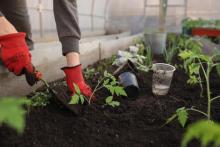Perspectives
Editorial by David Sedlacek
I was raised on a farm as the oldest boy of 15 children. My parents faithfully attended church, prayed together and instilled positive values of hard work, diligence and respect in us children. I love them for that and will be eternally grateful.
However, there was another painful reality that we lived with: emotional abuse and neglect. We were taught that we had
Editorial by Bob Cundiff
A few months ago, I sat through an excellent Sabbath School discussion where we tackled the tricky question of “the conference as the storehouse.” You can imagine how my role as conference president and guest speaker for the day adds spice to any discussion in which the conference can be seen as the beneficiary.
The study presented the usual questions: “Where is the storehouse? Why is it there?
Is that biblical?” As I listened to the discussion, a question arose in my mind that seemed to inform the discussion in a way that I found helpful. Rather than being a question of geography (Where is it?), our position on this question is informed by our identity (Who are we?).
 Story by Stewart Lozensky
Story by Stewart Lozensky
My wife and I returned from vacation to find that our garden had really grown. We had some catching up to do to bind the tomato plants and weed the grow boxes. She is, by far, the main gardener, and for that I am thankful. Our garden illustrates how quickly healthy plants grow.
Healthy things grow. God calls us individually and our churches to be healthy and grow too.
Editorial by Terry Forde
One of my favorite passage of scripture is found in Psalm 46:10, “Be still, and know that I am God.”
The term “Be still!” is sometimes spoken with frustrated urgency to a child being too active or noisy. But recently I learned that when the verse was first written, the phrase meant “to let go or release.”





